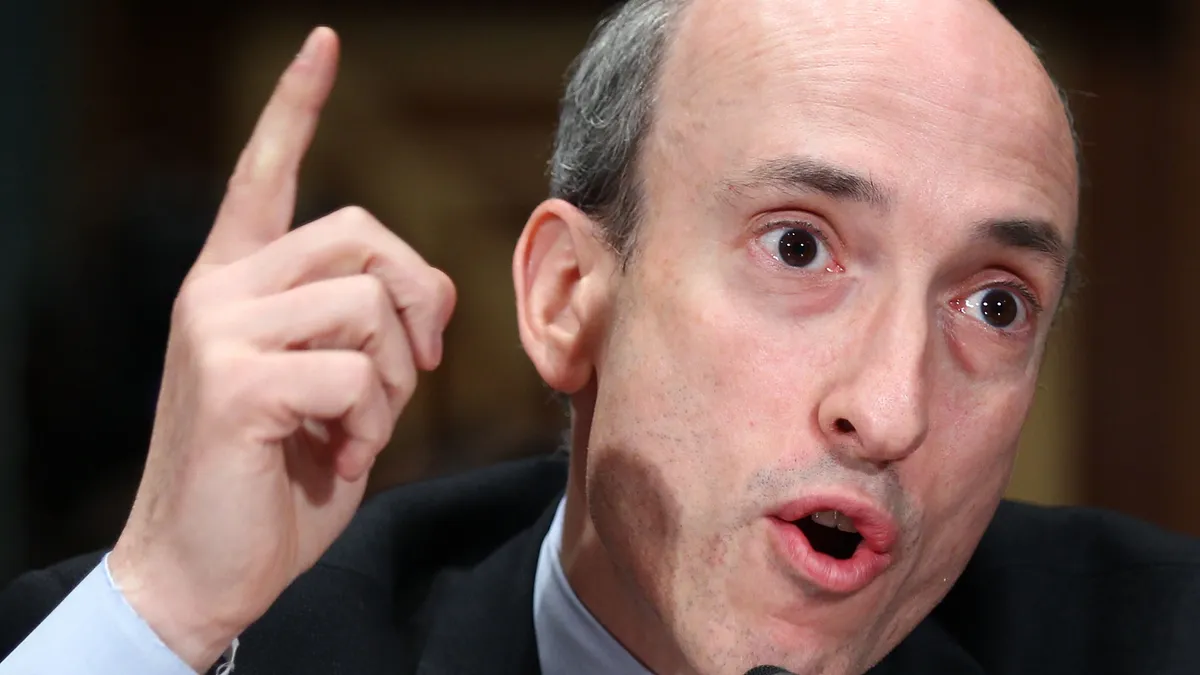Dive Brief:
- Securities and Exchange Commission (SEC) Chair Gary Gensler has asked agency staff to submit a proposal for mandatory climate risk disclosures for consideration by the end of 2021. Such reports may be required in an expanded Form 10-K and describe a company’s direct and indirect carbon emissions, including those by suppliers and partners in its "value chain."
- Companies may be required to disclose both qualitative and quantitative details, including how they manage climate-related risks and opportunities in day-to-day operations and in broad strategy, Gensler said Wednesday. They may also need to report on metrics such as greenhouse gas emissions, financial impacts of climate change and progress towards climate-related goals.
- "Today, investors increasingly want to understand the climate risks of the companies whose stock they own or might buy," Gensler said in remarks during a webinar. "Investors are looking for consistent, comparable, and decision-useful disclosures so they can put their money in companies that fit their needs."
Dive Insight:
Since assuming office in April, Gensler has advanced an SEC review of its regulation of climate disclosures, gathering more than 550 public comments in its push for detailed transparency.
The SEC may require companies to give climate change details the same prominence as other core information that they provide to investors, Gensler said. "I’ve asked staff to consider whether these disclosures should be filed in the Form 10-K, living alongside other information that investors use to make their investment decisions."
Companies may need to provide scenario analysis on how they would adapt to a range of physical, legal, market and economic impacts from climate change, including the costs and risks of cutting carbon emissions, he said.
"I believe it’s with mandatory disclosures that investors can benefit from that consistency and comparability," Gensler said. "When disclosures remain voluntary, it can lead to a wide range of inconsistent disclosures."
SEC staff will also consider whether to mandate distinct metrics related to climate change for specific industries, such as banking, insurance or transportation, Gensler said.
The stakes of disclosure are rising for publicly traded companies as both institutional and retail investment surges into assets tied to environmental, social and governance (ESG) principles.
Sustainability related financing has tripled since 2015, with a tenfold increase in flows to ESG funds, an eight-fold increase in sustainable debt issuance and a doubling in the value of ESG-related deals by private equity and venture capital firms, according to a report by Generation Investment Management.
At the same time, corporate "greenwashing" — the exaggeration of adherence to ESG commitments — is rife, according to Generation.
"Failure to tackle greenwash poses a serious risk to the sustainable transition," Generation said, noting "growing unease at the low quality of some net zero commitments, the gap between goals and actions and the absence of guardrails for those utilizing natural solutions, including as offsets."
Other U.S. regulators this year have stepped up efforts to ensure companies are responding to climate risks and providing adequate disclosure on carbon emissions.
Treasury Secretary Janet Yellen in April backed the SEC’s push for disclosure and said the Treasury will consider ways to promote the Biden administration's greenhouse gas reduction goals through taxation, international cooperation and economic policy.
Also, the Federal Reserve in January announced the creation of a supervision climate committee to "develop an appropriate program to ensure the resilience of supervised firms to climate-related financial risks."















